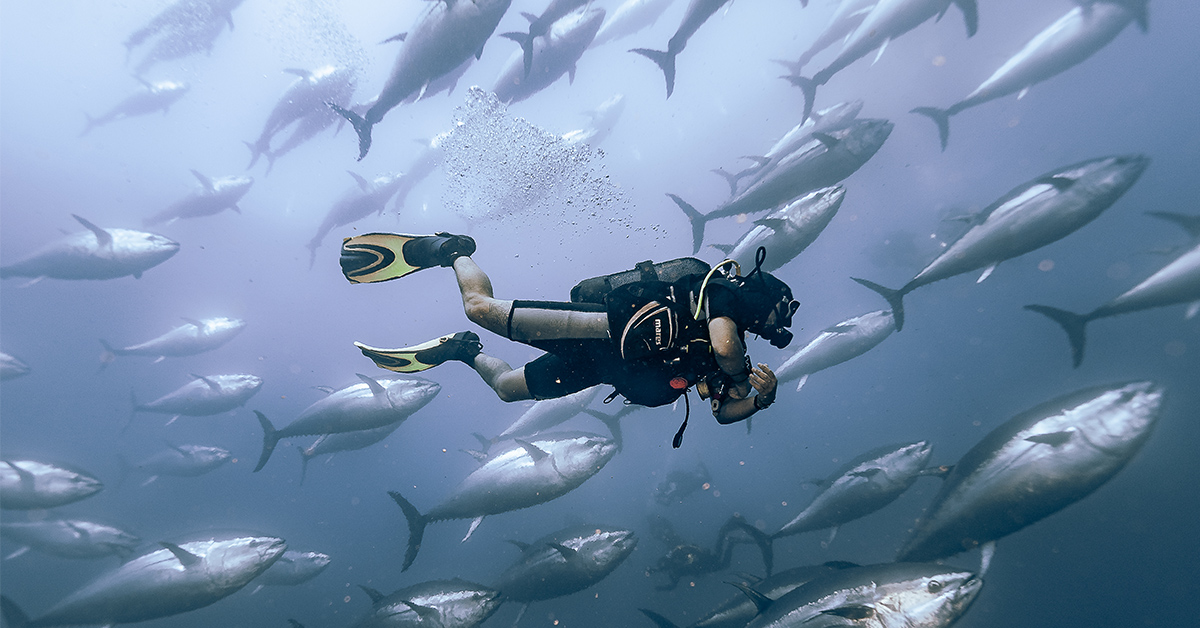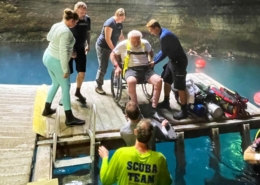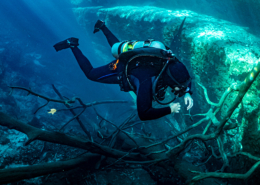The Awe Factor in Diving
By Daniel Xerri with photography by Jon Borg
Given that 71% of the planet is covered in water, divers get to see far more than those who never wander beyond the surface. In visiting the submerged parts of the world, most often divers experience a sense of awe. The idea that diving is conducive to awe can be traced to Jacques Cousteau’s pronouncement that “The sea, once it casts its spell, holds one in its net of wonder forever.” The awe that diving makes possible is caused by several elements and leads to various benefits.
What evokes awe?
To understand how diving evokes feelings of awe and wonder, it is first important to understand what these emotions consist of. The experimental psychologist and neuroscientist Ethan Kross defines awe as “the wonder we feel when we encounter something powerful that we can’t easily explain.” When we witness something complex, sublime, vast, beautiful or grand, we are likely to experience awe. While being comparable to wonder in how it elicits surprise, awe can also suggest fear or respect. Research involving the use of Functional Magnetic Resonance Imaging (fMRI) technology shows how experiences of awe lead people to perceive themselves as smaller in size. According to the social psychologist Michelle Shiota, awe-inspiring experiences force us to “perceive ourselves as smaller and less significant in relation to the rest of the world.” They act as little earthquakes that challenge the brain to question its assumptions and take notice of what is in front of it.
Being receptive to the sublime and magnificent while diving seems key. The cave diver and underwater explorer Jill Heinerth believes that “The wonder-filled moments of diving are everywhere if you pay attention.” Many divers claim to live such moments when submerged in the ocean. For example, a study of 50 individuals who dived in the kelp forests off the coast of Cape Town in South Africa reports that one of their main experiences consisted of awe and wonder. Lorraine Fisher describes having a similar experience when hundreds of hammerhead sharks suddenly approached her while diving in the Indian Ocean: “I stopped breathing, not through fear, but from sheer awe and wonder. The world slowed as I tried to savor every moment, remember every detail.” Irrespective of what the underwater event consisted of, most divers can attest to having experienced such awe-inspiring moments. It is probably one of the reasons that encourages them to keep descending beneath the surface.
How is awe beneficial?
Awe is seen as a highly rewarding experience due to a host of reasons that probably resonate with most divers. Albert Einstein valued it so
The above underscores the fact that another fundamental reason why awe is beneficial is that it encourages divers to communicate their experiences with others in the hope of making them care about the oceans. In the autobiography Into the Planet, Heinerth explains that whenever she shares the wonder, she can transform the thoughts and opinions of those around her. It is on this basis that the marine biologist Sylvia Earle asks, “Why is it that scuba divers and surfers are some of the strongest advocates of ocean conservation? Because they’ve spent time in and around the ocean, and they’ve personally seen the beauty, the fragility, and even the degradation of our planet’s blue heart.” Likewise, in his book In Oceans Deep, the biologist Bill Streever does not just discuss the awe that is evoked by deep sea exploration but also highlights the despair that divers and explorers experience because of the degradation they witness: “What is out of sight and out of mind for those who stay on the surface is blatantly obvious to those who venture beneath the waves.”
The need to raise awareness and change people’s attitudes and practices with respect to the seas became all too obvious to me when I naively joined a dive inside a tuna pen in Malta. The awe at seeing hundreds of massive bluefin tuna up close is unforgettable. However, this emotion was soon coupled with outrage once I learnt that unlike some other farmed species, these magnificent fish are caught in the wild as juveniles and forced to constantly swim in circles until they are big enough for slaughter. Fattening a single tuna by one kilo is estimated to require around 25 kilos of wild caught fish. The industrial scale of destruction wreaked by tuna farming is kept going by the lucrative nature of this source of food, which is not being harvested sustainably and thus resulting in depleted stock worldwide. While diving in close proximity to these big powerful fish was awe-inspiring and educational for me, I’m also aware that such an experience helps to incentivize this unsustainable industry and should perhaps be avoided.
Daniel Xerri is a trimix diver based in Malta. Follow him on Instagram @daniel.xerri
See more photography from Jon Borg on Instagram @jonborg











Leave a Reply
Want to join the discussion?Feel free to contribute!